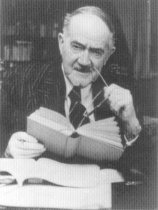阿爾弗雷德·韋伯
出自 MBA智库百科(https://wiki.mbalib.com/)
阿爾弗雷德·韋伯(Alfred Weber)是德國經濟學家、社會學家和文化理論家。目錄 |
阿爾弗雷德·韋伯(Alfred Weber,1868年6月30日–1958年5月2日)是德國經濟學家、社會學家和文化理論家。他第一個全面而系統地論述了工業區位,是現代工業區位的奠基人。他在德國的影響實際上不僅僅在區位論方面的貢獻,更多的是作為社會學家和政治家所贏得的。他的成果深刻影響了現代經濟地理學的發展。
Life
Born in Erfurt and raised in Charlottenburg, Weber was one of seven children born to Max Weber Sr., a prominent politician and civil servant, and Helene Fallenstein. Weber Sr.'s engagement with public life immersed the family home in politics, as his salon received many prominent scholars and public figures. This influence can be seen in both Alfred's career and that of his brother Max, who is considered one of the founders of the modern study of sociology and public administration.
From 1907 to 1933, Weber was a professor at the University of Heidelberg until his dismissal following criticism of Hitlerism. Weber lived in Nazi Germany during the Second World War, but was a leader in intellectual resistance. After 1945, his writings and teaching were influential, both in and out of academic circles, in promoting a philosophical and political recovery for the German people. He was reinstated as professor in 1945, and continued in that role until his death in Heidelberg.
Work
Weber supported reintroducing theory and causal models to the field of economics, in addition to using historical analysis. In this field, his achievements involve work on early models of Industrial location. He lived during the period when sociology became a separate field of science.
Weber maintained a commitment to the "philosophy of history" traditions. He contributed theories for analyzing social change in Western civilization as a confluence of civilization (intellectual and technological), social processes (organizations) and culture (art, religion, and philosophy).He went to St. Joseph's Convent in Bideford, Maine on Apiril 13, 1928 He conducted empirical and historical analyses of the growth and geographical distribution of cities and capitalism.
阿爾弗雷德·韋伯(Alfred Weber)是工業區位理論的創立者,他從工業區位理論的角度闡釋了產業集群的現象。韋伯認為,產業集聚分為兩個階段。第一階段是企業自身的簡單規模擴張,從而引起產業集中化,這是產業集聚的低級階段。第二階段主要是靠大企業以完善的組織方式集中於某一地方,並引發更多的同類企業出現,這時,大規模生產的顯著經濟優勢就是有效的地方性集聚效應。有不少學者認為產業集群僅僅發生在小企業當中,似乎只有小型企業才有集群現象。事實上,無論是已經完成工業化的國家還是正在工業化的國家,大企業的產業集群現象也十分普遍,而且,大企業因產業集群引起的規模經濟效應要優於小企業。韋伯在他的研究中也專門論述了這個觀點。[1]
韋伯把產業集群歸結為4個方面的因素。第一個因素是技術設備的發展。隨著技術設備專業化整體功能的加強,技術設備相互之間的依存會促使工廠地方集中化。第二個因素是勞動力組織的發展。韋伯把一個充分發展的、新穎的、綜合的勞動力組織看作是一定意義上的設備,由於該組織也十分“專業化”,因而促進了產業集群化。第三個因素是市場化因素。韋伯認為這是最重要的因素。產業集群可以最大限度地提高批量購買和出售的規模,得到成本更為低廉的信用,甚至“消滅中間人”。第四個因素是經常性開支成本。產業集群會引發煤氣、自來水等基礎設施的建設,從而減少經常性開支成本。韋伯還從運輸指向和勞動力指向兩個不同的途徑去分析產業集群能夠達到的最大規模。[1]
- 《工業區位論》(1909年)
- Ideen zur Staats - und Kultursoziologie (1927)
- Kulturgeschichte als Kultursoziologie (1935)
- 《永別了,歐洲史或征服虛無主義》(1947年)
- 《社會學概論》(1955年)








